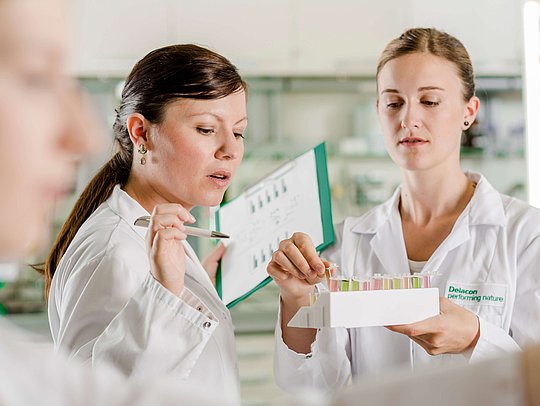Bioactives in livestock feeding - plant power that pays off - Part 2
Let's go further on our natural path with plant power being our driving force. After giving you an insight into Delacon’s phytogenic universe and the power of phytogenics in our first part of this article, we will now show you the benefits and the application of phytogenics in animal nutrition. Beyond, we will explain the zootechnical registration and the meaning of the "gold standard" in this context. Interested? Here comes part 2.
PFAs: Benefits for everyone
The spectrum of benefits arising through the application of phytogenics in animal nutrition is as broad as their mode of action: Phytogenics used as natural flavour enhancers have been proven to provide a return on investment.
Advantages of using PFAs arise on different levels in the animal production process:
- Animals benefit by supported health and maintaining the immune system status by promoting a balanced intestinal flora.
- Consumers benefit by totally safe and natural products within the food chain.
Zootechnical registration: an independent evaluation

In the European Union feed additives must be registered to ensure their safety for the target animals, consumers and the environment. Moreover, within the registration process the feed additive will be allocated to one out of five categories:
- Technological additives: any substance added to feed for a technological purpose
- Sensory additives: any substance, the addition of which to feed improves or changes the organoleptic properties of the feed, or the visual characteristics of the food derived from animals
- Nutritional additives: including functional groups of ‘trace elements’, ‘vitamins’, ‘amino acids’ and ‘urea’
- Zootechnical additives: any additive used to affect favorably the performance of animals in good health or used to affect favorably the environment
- Coccidiostats and histomonostats
An authorization as "zootechnical additive", is the “Scientific Gold Standard” of the feed industry. Precedent to officially claim any effect on animal performance, it requires evidence of the claim and an application request to the European Commission. Within this comprehensive and complex registration process, the European Committee gives a mandate to independent scientists of the European Food Safety Authority (EFSA), who assess scientific data on the product obtained in several trials (conducted in different countries) provided by the applicant. After an intensive evaluation of these data, EFSA formulates a scientific opinion on the efficacy and safety of the product. A positive opinion is the basic requirement for a subsequent EU approval.
A zootechnical registration guarantees the effectiveness of phytogenic products that were risk assessed by EFSA and will be granted exclusively to products with significant beneficial effects on animals’ performance. Although different regions use comparable systems to authorize feed additives, the registration process of the EU is an international standard that is recognized worldwide.
The commercial advantage of such products to users is the confidence that they have passed a stringent, independent assessment of quality, safety and efficacy, which will deliver consistent performance in the field. Though achieving the zootechnical approval is challenging, to date only a handful of plant derived (or nature-identical) feed additives have succeeded.
Conclusion

The application of phytogenics in animal nutrition represents a relevant strategy in livestock nutrition concerning proven efficacy and beneficial effects on animals’ performance. They are natural, sustainable, innovative and safe. Delacon drives continuous effort and innovative research to improve and optimize phytogenic products that are tailored to the current challenges of animal production while additionally meeting the consumers demands for an antibiotic-free feed to food chain.
Relating to the proven beneficial characteristics, phytogenic feed additives are foreseen to have the potential to become a new generation of substances for innovative livestock nutrition, thus being a precious tool with advantages for all involved: the animals, the farmer, the consumers and the environment.

Elisabeth Rohrer
After her study in agriculture sciences at the university of natural resources and life sciences in Vienna, Elisabeth joined the Delacon team in December 2013 as Technical Communications Manager - a position, she always exerted with pleasure. Since 2021, her task areas have been extended and thus, she is also supporting colleagues in writing offside the technical focus as Content Manager. Elisabeth describes herself as a great animal and nature lover and prefers to spend her free time high up in the mountains with her little family, away from the hustle and bustle.










